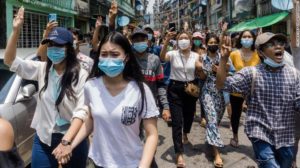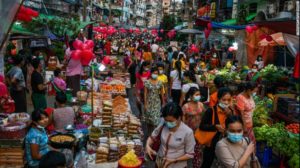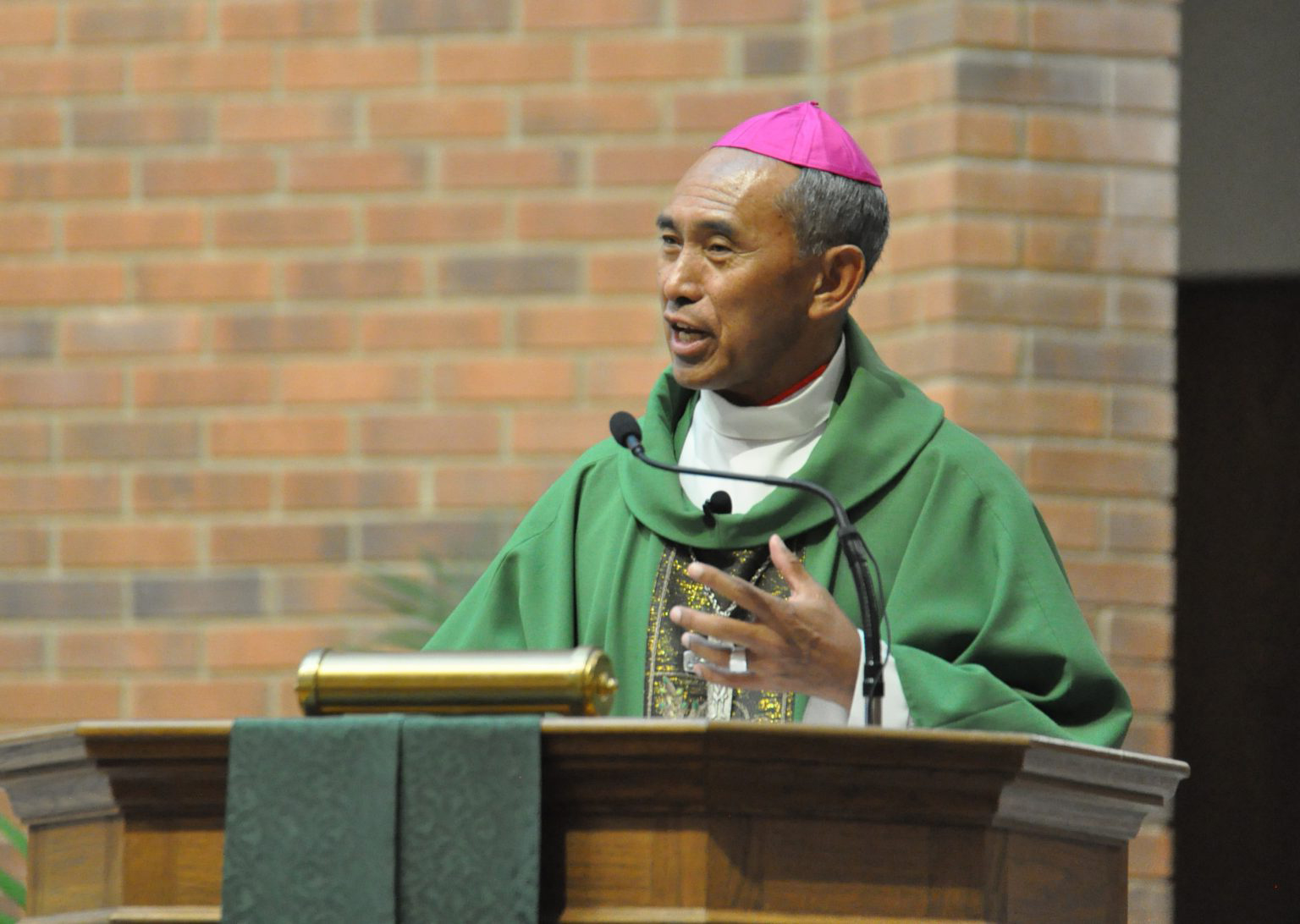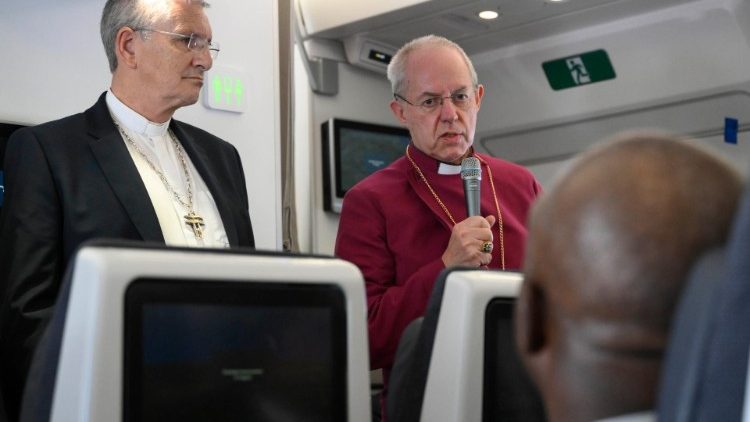Double crises of coup and Covid could push half of Myanmar’s population into poverty, UN warns
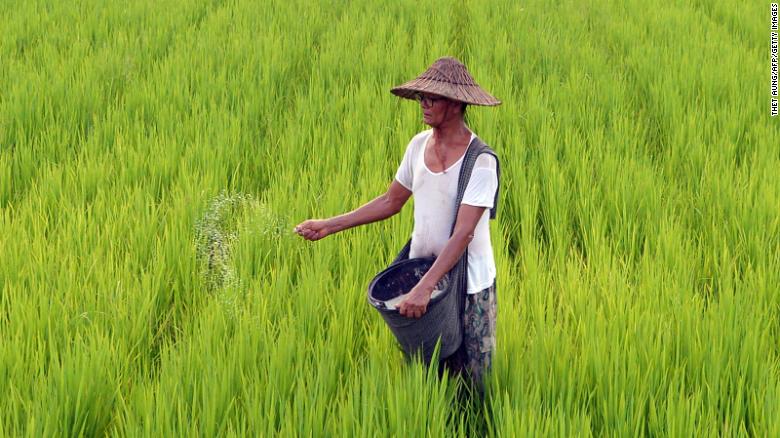
Apr 30, 2021
Yangon, Myanmar: Almost half of Myanmar’s population could be forced into poverty by the end of the year as the country teeters on the brink of economic collapse caused by the double shock of a bloody military coup and the Covid-19 pandemic, according to a new United Nations report.
Rising food costs, significant losses of income and wages, the crumbling of basic services such as banking and health care, and an inadequate social safety net is likely to push millions of already vulnerable people below the poverty line of $1.10 a day — with women and children among the hardest hit.
Analysis from the UN Development Program (UNDP), published Thursday, warned that if the security and economic situation does not stabilize soon, up to 25 million people — 48% of Myanmar’s population — could be living in poverty by 2022.
That level of impoverishment has not been seen in Myanmar since 2005, when the country was an isolated, pariah nation ruled by a previous military regime, it said.
UNDP administrator Achim Steiner said it is clear “ we are contending with a tragedy unfolding.”
“ We have fractured supply chains, (disrupted) movement of people and movement of goods and services, the banking system essentially suspended, remittances not being able to reach people, social safety payments that would have been available to poorer households not being paid out. These are just some of the immediate impacts,” Steiner said. “ The protracted political crisis will obviously worsen this.”
Myanmar had made solid progress in reducing poverty, particularly since the start of a democratic transition from military rule in 2011 that prompted economic and political reforms.
Over the past 15 years, the country effectively halved its poverty rate from 48.2% in 2005 to 24.8% in 2017, according to the report. It was still considered one of the poorest countries in Asia, however, with an estimated third of the population subsisting on such a low or precarious income it was one economic shock away from being thrown back into poverty.
For many, that shock came in the form of the global coronavirus pandemic. Lockdowns and containment measures disrupted supply chains, so businesses — especially in retail, manufacturing and exports, as well as smaller businesses, market sellers, hairdressers and tailors — suffered. By December last year, more than 420,000 migrant workers had returned home.
By the end of the year, 83% of households in Myanmar reported their incomes had been slashed by about half due to the pandemic, the report found.
The second shock came in the morning of February 1, when armed forces commander in chief Gen. Min Aung Hlaing seized power, overthrowing the democratically elected government of Aung San Suu Kyi and her National League for Democracy party and installing a military junta.
The following months have seen ongoing protests against his rule and the rise of a Civil Disobedience Movement in which thousands of blue- and white-collar workers including doctors, teachers, civil servants and factory workers have gone on strike with the aim of disrupting the economy and unseating the general.
Security forces have brutally suppressed the protests with deadly and systematic crackdowns in which police and soldiers have shot dead people in the streets and arbitrarily detained perceived opponents. More than 750 people have been killed by security forces since the coup, and more than 4,500 arrested, according to advocacy group Assistance Association of Political Prisoners.
The compounding economic crises of the pandemic and military takeover risk completely wiping out the progress Myanmar has made in reducing poverty, the report said — and the number of people in poverty in the country is likely to double by next year.
The impact of the pandemic alone would have raised Myanmar’s poverty level from 24.8% to 36.1%, the UNDP estimated. If the massive economic and social disruption of the coup continues, that increases further to 48.2%.
“ By then, the shock from the crisis will have resulted in significant losses of wages and income, particularly from small businesses, and a drop in access to food, basic services and social protection,” the report said.
Urban poverty is expected to triple as the towns and cities have been hardest hit by Covid-19 and remain the focus of the most severe military crackdowns.
According to the study, women and children will bear the heaviest brunt. Myanmar already has high child poverty rates and the combined crises are “ putting an entire generation in peril,” the UN Children’s Fund (UNICEF) said. Rising poverty means children are less likely to stay in school and the loss of key services in education and health care, for example, will lead to “ profound physical, psychological, educational and economic impacts.”
Women-led households are more vulnerable, the report added, as women are more likely to be employed in sectors affected by the coronavirus, such as the garment industry. And women disproportionally bear the burden of household chores associated with Covid-19, such as caring for the sick or home-schooling children, which forces many to drop out of the labor market, the report said.
The two crises are not independent of one another. The overthrow of the civilian government has already amplified the impacts of the coronavirus — Covid-19 testing has collapsed since the coup, doctors say.
Meanwhile, the takeover has “ derailed” any hope for a post-pandemic recovery, the report said. The deteriorating security conditions have seen a further breakdown of supply chains already disrupted by Covid. Key ports are paralyzed as customs agents, dockworkers, lorry drivers and rail workers halt work.
Some shipping firms have temporarily stopped services to the country, the report said. About 80% of Myanmar’s trade is seaborne, and the UNDP estimated trade in ports dropped by up to 64% in the two months after the coup.
Similar disruptions to transport and the movement of labor and goods, as well as pressure on the country’s currency, the kyat, has also hit Myanmar’s agriculture industry, which 70% of the population depend on for their livelihoods.
“ Across Myanmar society this is a major setback, not only in development but also in terms of inequality and vulnerability,” Steiner said. “ People will struggle to survive.”
A humanitarian crisis is unfolding as a result. The UN World Food Program last week warned “ hunger and desperation” are rising in Myanmar and predicted that up to 3.4 million people will be suffering across the country in the next six months.
“ Overall, Myanmar is on the brink of economic collapse and risks becoming Asia’s next failed state,” the UNDP report said.
To reach its conclusions, the UNDP used a range of sources, including published data from the World Bank, the Brookings Institution, reports from other UN agencies, media reports and household surveys from Myanmar.
Because real-time data is difficult to obtain, the UNDP said if the multiple crises of Covid-19, human rights, democratization and security extend even further, the estimates may be worse than predicted — especially for vulnerable groups such as ethnic minorities and internally displaced people.
“ Much will depend on what’s happening in Myanmar over the next two months,” Steiner said.







